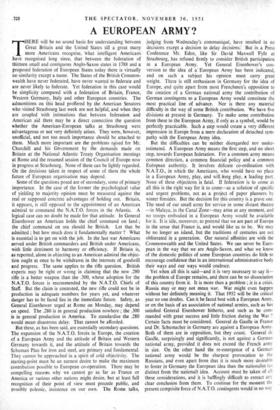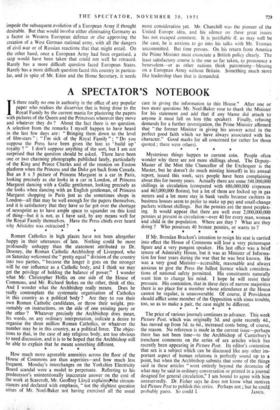A EUROPEAN ARMY ?
THERE will be no sound basis for understanding between Great Britain and the United' States till a great many more Americans recognise, what intelligent Americans - hav'e recognised long since, that between the federation of thirteen small and contiguous Anglo-Saxon states in 1788 and a proposed federation of European States today there is virtually no similarity except a name. The States of the British Common- wealth have never federated, have never wanted to federate and are never likely to federate. Yet federation in this case would be simplicity compared with a federation of Britain, France, Western Germany, Italy and other European countries. The admonitions on this head proffered by the American Senators who visited Strasbourg last week are not helpful, and when they are coupled with intimations that between federation and American aid there may be a direct connection the question whether the American-European talks at Strasbourg were advantageous or not very definitely arises. They were, however, unofficial, and not too much importance should be attached to them. Much more important are the problems raised for Mr. Churchill and his Government by the demands made on Britain at the National Atlantic Treaty Organisation meetings at Rome and the resumed session of the Council of Europe now in progress at Strasbourg. None of them can be lightly regarded. On the decisions taken in respect of some of them the whole future of European organisation may depend.
Some of the questions posed are of secondary, some of primary importance. In the case of the former the psychological value of yielding to majority opinion must be measured against the real or supposed concrete advantages of holding out. Britain, it appears, is still opposed to the appointment of an American admiral to command the N.A.T.O. forces in the Atlantic. A logical case can no doubt be made for that attitude. In General Eisenhower an American holds the chief command on land ; the chief command on sea should be British. Let that be admitted ; but how much does it fundamentally matter ? What is essential is to get on with the job. In the last war Americans served under British commanders and British under Americans, with little detriment to harmony or efficiency. If Britain is, as reported, alone in objecting to an American admiral the objec- tion ought at once to be withdrawn in the interests of goodwill and progress. The same applies to the rifle question. British experts may be right or wrong in claiming that the new .280 rifle is a better weapon than the 300. whose adoption for the N.A.T.O. forces is recommended by the N.A.T.O. Chiefs of Staff. But the claim is contested, the new rifle could not be in production in adequate numbers for years yet, and whatever danger has to be faced lies in the immediate future. Safety, as General Eisenhower urged at Rome on Monday, may depend on speed. The .280 is in general production nowhere ; the .300 is in general production in America. To standardise the .280 would mean disastrous delay. That cannot be afforded.
But these, as has been said, are essentially secondary questions. The expansion of the N.A.T.O. forces in Europe, the creation of a European Army and the attitude of Britain and Western Germany towards it, and the attitude of Britain towards the Schuman Plan for iron and steel, are primary and fundamental. They cannot be approached in a spirit of cold objectivity. The starting-point must be an earnest desire to make the maximum 'Contribution possible to European co-operation. There may be compelling reasons why we cannot go as far as France or America or various other nations might desire, but at least full recognition of their point of view must precede public, and possibly polemic, insistence on our own. The Rome talks, judging from Wednesday's communiqué, have resulted in no decisions except a decision to delay decisions. But in a Press Conference Mr. Eden, like Sir David Maxwell Fyfe at Strasbourg, has refused firmly to consider British participation in a European Army. Yet General Eisenhower's con- version to the idea of a European Army has been indicated, and on such a subject his opinion must carry great weight. There is still enthusiasm in Germany for the idea of Europe, and quite apart from most Frenchmen's opposition to the creation of a German national army the contribution of German contingents to a European Army would constitute the most practical line of advance. Nor is there any material difficulty in the way of some British contribution. We have five divisions at present in Germany. To make some contribution from these. to the European Army, if only as a symbol, would be perfectly practicable. Such a step would create a very different impression in Europe from a mere declaration of detached sym- pathy with the European Army idea.
But the difficulties can be neither disregarded nor under- estimated. A European Army means the first step, and no short step, towards European federation. For a common army means common direction, a common financial policy and a common Eukopean authority. It involves delicate co-ordination with N.A.T.O., in which the Americans, who would have no place in a European Army, play, and will long play, a reading- part. None of these objections is fatal. If federation is to come at all this is the right way for it to come—as a solution-of specific and urgent problems, not as a project of paper planners by winter firesides. But the decision for this country is a grave one. The need of our small army for service in some distant theatre —in Malaya, in the Canal Zone—may arise at any moment, and no troops embodied in a European Army would be available for it. It is idle, moreover, to pretend that we are part of Europe in the sense that France is, and would like us to be. We may be no longer an island, but the traditions of centuries are not obliterated in a generation. Our natural affinities are with the Commonwealth and the United States. We can never be Euro- pean in the way that we are Anglo-Saxon, and what we know of the domestic politics of some European countries do little to encourage confidence that in an international administrative body their ways and our ways would coalesce.
Yet when all this is said—and it is very necessary to say it— the problem of Europe remains, and there can be no dissociation of this country from it. It is more than a problem ; it is a crisis.
Russia may or may not mean war. War might even happen without her definitely meaning it. That 1952 will be the critical year no one doubts. Can it be faced best with a European Army, or on the basis of an association of national armies, such as has satisfied General Eisenhower hitherto, and such as he com- manded with great success and little friction during the War ?
Certain facts must be- considered. General de Gaulle in France and Dr. SchUmacher in Germany are against a European Army. Both of them are in opposition, but they count. General de Gaulle, surprisingly and significantly, is not against a German national army, provided it does not exceed the French army in. size. On the other hand the re-emergence of a German national army would be the sharpest- provocation to the Russians, and even apart from that it is much more desirable to foster in Germany the European idea than the nationalist (as distinct from The national) idea. Account must be taken of all these considerations, and it is bafflingly difficult to extract any clear conclusion from them. To continue for the moment the present compOsite force of N.A.T.O. contingents would in no way
impede the subsequent evolution of a European Army if thought desirable. But that would involve either eliminating Germany as a factor in Western European defence or else approving the creation of a West German national army, with all the dangers of civil war or of Russian reactions that that might entail. On the other hand, once a European Army had been organised, a step would have been taken that could not well be retraced. Rarely has a more difficult question faced European States. Rarely has a more difficult question faced this country in particu- lar, and in spite of Mr. Eden and the Home Secretary, it needs more consideration yet. Mr. Churchill was the pioneer of the United Europe idea, and his silence on these great issues has not escaped comment. It is justifiable if, as may well be the case, he is anxious to go into his talks with Mr. Truman uncommitted. But time presses. On his return from America the Prime Minister must enunciate a British policy clearly. The least satisfactory course is the one so far taken, to pronounce a benevolent—or as other nations think patronising—blessing on a European Army without Britain. Something much more like leadership than that is demanded.



































 Previous page
Previous page